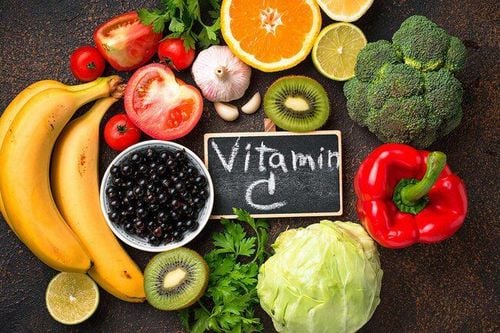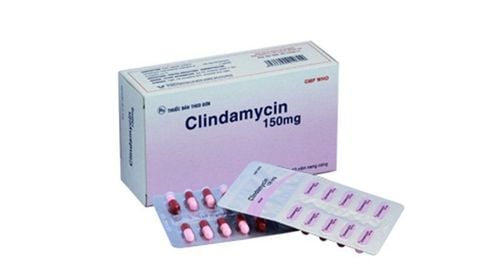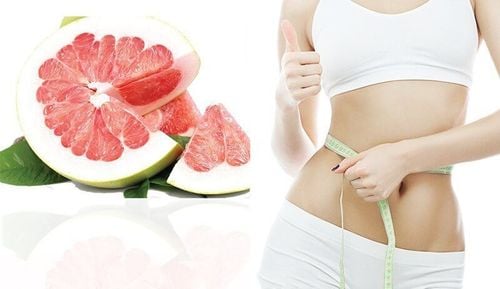This is an automatically translated article.
Grapefruit is a citrus fruit, providing many vitamins and minerals beneficial to health. However, it can interact with some common drugs, changing the effects in the patient's body when taking the drug.
1. How does grapefruit juice affect medications?
Although grapefruit and grapefruit juice are part of a healthy diet, many patients who love this fruit have expressed concerns about their potential to interact with medications they are taking.
According to Shiew Mei Huang, PhD, US Food and Drug Administration, grapefruit juice can increase levels of the active ingredient fexofenadine (for example, Allegra is commonly used to relieve symptoms of seasonal allergies. ) enters the bloodstream less, reducing the effectiveness of the drug. Instead of changing metabolism, grapefruit juice can affect proteins in the body (also known as drug transporters. These proteins help move a drug into our cells for absorption. ), which causes less of the drug to enter the bloodstream and the medicine may not work as well.
The cause of such interactions is that the drug is normally metabolized in the liver and small intestine by a group of specialized proteins called cytochromes (CYP3A4). Grapefruit juice contains chemicals called furanocoumarins that block the action of CYP3A4, so instead of being metabolized, more of the drug enters the bloodstream and stays in the body longer. The result is making too much of the drug in your body. The amount of CYP3A4 enzyme in the gut varies from person to person, says Dr. Huang. Some people have a lot of enzymes and others only a little. So grapefruit juice can affect people differently even if they take the same medicine. Here are the causes of those interactions:
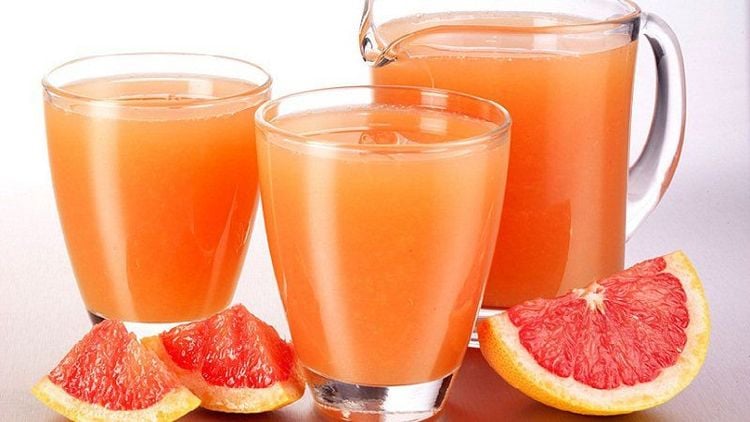
Bưởi là một loại trái cây có múi, cung cấp nhiều vitamin và khoáng chất có lợi cho sức khỏe
2. Possible side effects
Possible side effects when taking drugs that interact with grapefruit include: Irregular heartbeat, stomach bleeding, muscle pain, muscle failure, kidney damage, low blood pressure, shortness of breath, dizziness.
Other reactions may occur depending on the drug and blood levels..
3. Common drugs have dangerous interactions with grapefruit
3.1. Certain cholesterol medications (commonly known as statins) Statins work by limiting the natural production of cholesterol. Helps to improve blood lipoprotein levels and reduce heart disease mortality in patients at risk for hyperlipidemia.
Statins can cause rhabdomyolysis and breakdown of muscle tissue. Leads to muscle weakness, pain, and sometimes kidney damage. Grapefruit juice significantly increased levels of 3 common statins that cause rhabdomyolysis:
Atorvastatin (Lipitor); Lovastatin (Mevacor); Simvastatin (Zocor). One study found that drinking a glass of grapefruit juice with simvastatin or lovastatin increased blood statin levels by 260%.
Alternatives to some cholesterol medications that interact with grapefruit include: pravastatin (Pravachol), rosuvastatin (Crestor) and fluvastatin (Lescol).
3.2. Some blood pressure drugs Most blood pressure drugs are not affected by grapefruit juice except for the following 4 drugs:
Felodipine; The drug Nifedipine (Procardia); The drug Losartan (Cozaar); Eplerenone (Inspra). The first 2 drugs on this list are called calcium channel blockers. They work by changing the way blood vessels use calcium, dilating them and lowering blood pressure. The last 2 drugs on this list work by decreasing the action of a hormone called angiotensin 2, which naturally raises blood pressure.
One study found that nifedipine blood levels were significantly increased when drinking about 2 cups (500ml) of grapefruit juice. This leads to a rapid drop in blood pressure, which can be dangerous if left unattended. Losartan (Cozaar) is affected by grapefruit juice leading to reduced effects, no longer able to limit the ability to control blood pressure. Eplerenone works similarly to losartan, but its levels are increased when taken with grapefruit. Eplerenone levels that are too high can cause too much potassium in the blood, which can interfere with heart rhythm. Alternatives to some blood pressure medications that interact with grapefruit include: Spironolactone (Aldactone), a drug similar to losartan and eplerenone. Amlodipine (Norvasc) is a calcium channel blocker like felodipine and nifedipine.
3.3. Group of drugs to treat heart rhythm Grapefruit juice affects the following 2 drugs to treat heart rhythm, the interaction can be especially dangerous:
Amiodarone; Dronedarone (Multaq). One study gave 11 men who were receiving amiodarone a glass of grapefruit juice (about 300 mL). The level of drug interactions increased by up to 84%, compared with those who did not drink.
Although these 2 drugs play an important role in the health management of patients with arrhythmias, the changes associated with grapefruit interacting with these drugs sometimes cause rhythm changes. dangerous heart.
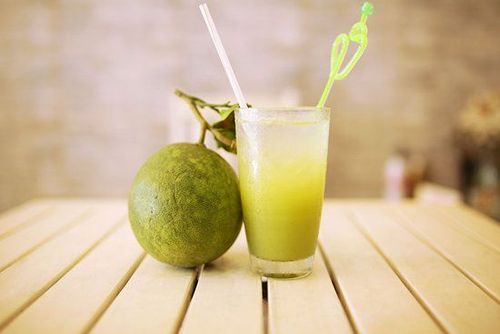
Nước ép bưởi ảnh hưởng tới 2 loại thuốc điều trị nhịp tim
3.4. Anti-infectives Anti-infective drugs differ in their action and breakdown in the body.
Although anti-infectives are among the most diverse of their kind, there are only a few drugs that have important interactions with grapefruit including:
Erythromycin; Rilpivirine and related anti-HIV drugs; Primaquine and related antimalarials; Drug Albendazole. Erythromycin is used to treat certain types of infections caused by bacteria. One study comparing grapefruit juice with water in patients taking erythromycin found that the juice increased blood levels of the drug by 84%. Excessively high levels of this medicine can cause arrhythmias.
Grapefruit juice also increased levels of the HIV drugs rilpivirine and maraviroc, in addition to the antimalarial drugs related to primaquine. Interactions can affect the heart rate and function of the patient's body.
Because antibiotics are usually taken for a limited time, it is advisable to avoid eating grapefruit while taking these medications.
Preparations to replace some anti-infective drugs that interact with grapefruit include: Clarithromycin is a drug in the same class as erythromycin that does not interact with grapefruit. Doxycycline is both an antibiotic and an antimalarial and does not interact with grapefruit.
3.5. Mood Medications Most antidepressants and anti-anxiety medications are safe to take with grapefruit. However, there are several types of interactions including:
Quetiapine; Lurasidone (Latuda); Ziprasidone (Geodon); Buspirone (Buspar); Diazepam (Valium); Midazolam (Versed); Triazolam (Halcion). Medicines such as quetiapine and lurasidone are used to treat mood disorders and behavioral disorders. Increased levels of these drugs can cause changes in heart rate or drowsiness.
Diazepam, midazolam, triazolam are sedatives that are sometimes used for panic attacks or other forms of anxiety. One study compared some of these drugs in nine patients, some of whom ate grapefruit. It turns out that grapefruit can increase the effects of these drugs, leading to excessive sleepiness.
3.6. Anticoagulants Blood thinners are used to treat or prevent blood clots. Some of them are affected by grapefruit, including:
The drug Apixaban (Eliquis); Rivaroxaban (Xarelto); Clopidogrel (Plavix); Ticagrelor (Brilinta). Clopidogrel depends on CYPs - proteins that grapefruit restricts - to work. So it becomes less active when mixed with grapefruit.
A study of 7 patients receiving clopidogrel with 200ml of grapefruit juice or water showed lower drug activity with grapefruit juice. However, the anticoagulant ability of the drug was not affected. In contrast, grapefruit increases the blood levels of the other drugs on this list, which can lead to bleeding.
Alternatives to some anticoagulants that interact with grapefruit include: Warfarin (Coumadin) used for the same purposes as apixaban and rivaroxaban. While warfarin is sensitive to foods containing vitamin K, its activation is not affected by grapefruit
3.7. Group of pain relievers 3 types of pain relievers affected by grapefruit juice include:
Fentanyl drugs; Oxycodone drug; Colchicine drug. Fentanyl and oxycodone are anesthetic analgesics. Although their blood levels were only slightly affected by a small amount of grapefruit, it was able to change how long they remained in the body.
Colchicine is an older medicine used to treat gout. It is processed by CYPs and may interact with grapefruit. However, a 2012 study found that drinking 240mL of grapefruit juice had only minimal impact on how well the drug worked.
Alternatives to some pain relievers that interact with grapefruit include: Morphine and Dilaudid.
3.8. Drugs for Erectile Dysfunction and Prostate Disorders Some of the drug classes for erectile dysfunction and prostate problems that deserve attention regarding their interactions with grapefruit are:
Sildenafil (Viagra); Tadalafil (Cialis); Medicine Tamsulosin (Flax); Silodosin (Rapaflo). Erectile dysfunction drugs such as sildenafil and tadalafil work by dilating blood vessels, increasing blood flow to an erection. Because other blood vessels also dilate with these drugs, the increased blood levels of these drugs caused by grapefruit can lower blood pressure. In addition, prostate medications such as tamsulosin can also increase dizziness and low blood pressure when taken with grapefruit.
Alternatives to some erectile and prostate dysfunction drugs that interact with grapefruit include: Another class of prostate cancer drugs, including Finasteride and dutasteride, are unaffected. significantly by grapefruit.
4. Can it be taken at a different time than grapefruit juice to prevent interactions?
Taking the medicine at a different time than when drinking grapefruit juice will not prevent the interaction. The effects of grapefruit juice on some medications can last for more than 24 hours. So, even if you take the medicine only once a day, you should avoid drinking grapefruit and grapefruit juice for the duration of your treatment.
In some cases, you can drink grapefruit juice in smaller amounts, so you should follow the instructions for each individual medication or ask your healthcare practitioner.
It is important to remember that even just eating a few grapefruit segments and about 1 cup of grapefruit juice together is enough to change the concentration of the drug in the blood. And some of these drugs can affect or have side effects from exposure to grapefruit.
If you are taking medication that interacts with grapefruit, switch to an alternative or stop consuming grapefruit. In case you experience dangerous side effects when the drug interacts with grapefruit, inform your doctor immediately.
Please dial HOTLINE for more information or register for an appointment HERE. Download MyVinmec app to make appointments faster and to manage your bookings easily.
References: fda.gov, drugs.com, healthline.com




